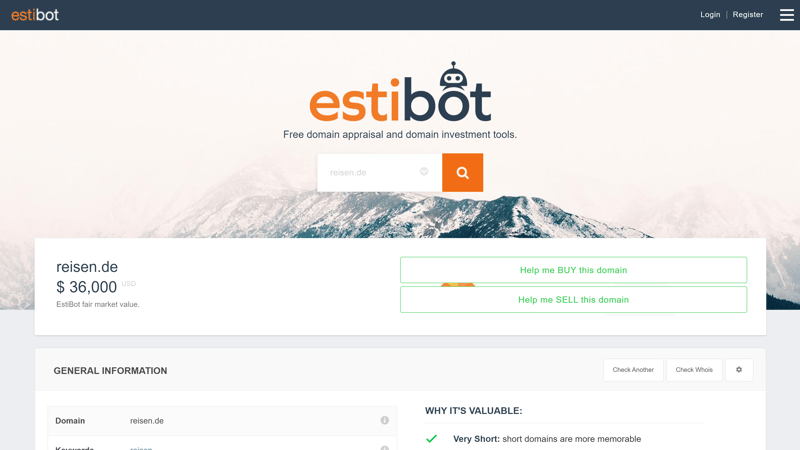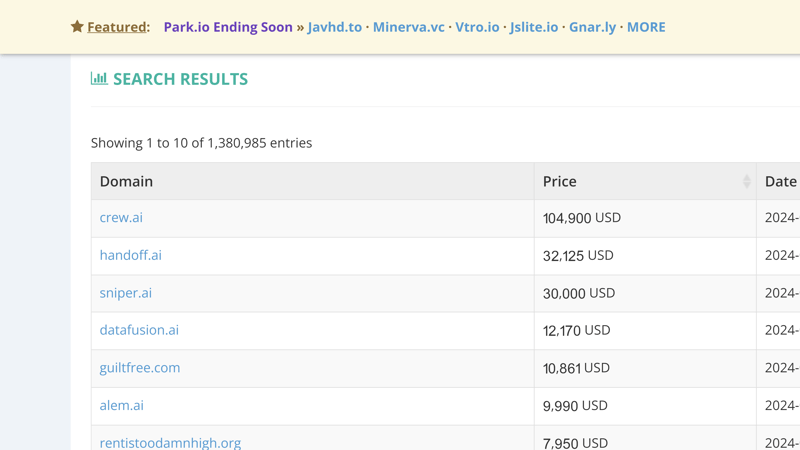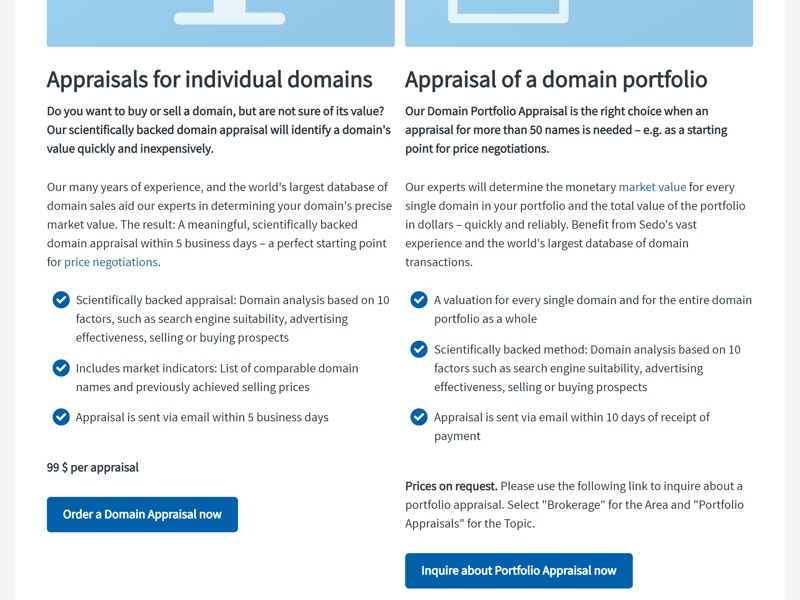Check Domain Value: How Much is a Domain Really Worth?
If you're looking to buy or sell a domain, you should know how much it's worth. That's not as straightforward as it might seem: the domain market is dynamic, and many factors can influence prices, making it tricky to figure out a domain's true value.
We'll explain how you can realistically estimate the value of a domain and what factors play a role in the process.
How Much Is a Domain Worth?
The value of a domain largely depends on whether it's already taken. If the domain is available, its value is straightforward: it's the price set by the domain provider.
For example, .com domains typically cost between $10 and $20 per year, though prices for other domain extensions can vary significantly.
Things get more complicated with domains already owned by others. In those cases, a domain is worth as much as someone is willing to pay for it, just like anything else on the free market.
This means the value of a domain isn't set in stone but fluctuates based on supply and demand. If you want to purchase or sell a domain, you need to figure out how much it's worth. But how?
How Can I Determine a Domain's Value?
You can determine a domain's value with or without online tools and services. Let's look at both options:
Determining a Domain's Value Without Tools
Since no online tool is 100% reliable, you should always do some research on your own. To help you determine a domain's value, you can use a few specific metrics:
Length and Simplicity
Shorter and catchier domains are often more valuable because they’re easier to remember and have higher recognition value.Age
Domains can grow in value as they age. They are often already established in search engines and considered more trustworthy.Top-Level Domain
A domain's extension, known as the top-level domain (TLD), can also affect its value. For example, .com domains are generally more valuable than less common extensions because they are seen as secure and established.Keywords
Domains that contain popular and commercially valuable keywords are often worth more. These keywords typically attract more traffic and improve the domain's SEO potential. You can determine a keyword's search volume and popularity using free tools like Google Trends or WordStream.Associated Website
A domain linked to an active, established, and well-visited website is generally more valuable than one that is unused or points to an unsuccessful website. The website’s search engine ranking also plays a significant role.Legal Risk
Check if a domain poses potential legal issues, such as trademark violations. Domains that use existing brand names or registered trademarks without permission can be legally and financially risky.
Conversely, there are also factors that can negatively affect a domain's value, including:
long and complicated names
negative terms and associations
low search volume
unpopular domain extensions
If you want to buy or sell a domain, being familiar with these aspects will help you negotiate more confidently. You should also be able to answer the following five questions:
- 1.
Who might need the domain – and why?
- 2.
How much money could someone earn with it?
- 3.
How SEO-friendly is the domain?
- 4.
How (geographically) relevant is the domain extension?
- 5.
What is the domain's historical performance?
Even with thorough research, putting a price tag on your domain can be challenging. There are no fixed rules or calculations, especially for unused domains that aren’t linked to a website (and thus to specific visitor numbers and revenues).
Therefore, it can be helpful to get some support when evaluating the value of a domain.
Using Tools to Determine a Domain's Value
You don't have to figure out your domain's value on your own. There are numerous online tools and services available to assist you, ranging from quick automatic valuation tools to expert services that provide personalized evaluations.
Automatic Valuation Tools
You'll find lots of “domain appraisal” tools give you an estimate of a domain's value based on its URL. Some of the most well-known are estibot.com and GoDaddy.com.

Online valuation tools can help determine a domain's value.
Unfortunately, these online valuation tools are not very reliable. The two tools mentioned above gave completely different results for the same domain keyword – strollers.com:
estibot.com estimated it at $860,000.
GoDaddy.com's estimate was just $19,338.
You can use these tools and include their results in your estimate, but they won't give you a reliable, objective value.
Comparison Tools for Market Research
Online tools that analyze historical domain sales data are more useful. Providers like namebio.com or DNPric.es – or even estibot.com's other tools – can show you how much other domains have sold for in the past.
With this data, you can determine your domain's market value in the context of similar sales.

namebio.com shows the sale prices of domains.
This kind of comparison data is valuable because it gives you an idea of the price range for domains with similar names or in related industries.
They're also useful for spotting trends, such as the rising or falling popularity of certain domain extensions and keywords.
Expert Valuation
You can also have experts determine a domain's value. This service usually costs money but gives you a detailed and personalized estimate based on expert analysis.
Experts consider many factors, including market trends, SEO metrics, potential, and legal risks. Their evaluations are often more accurate and reliable than automatic ones because they include human expertise.

You can also get an expert domain valuation.
There are many providers with different prices and conditions, such as:
At sedo.com, you can commission domain valuations for individual domains for $99 each. The analysis is based on ten factors, including SEO suitability and advertising impact.
AccurateAppraisals offers expert appraisals with a signed appraisal certificate for $88 per domain.
Reputable domain valuations done by experts are more detailed and generally more reliable than automatic ones.
But remember, these are still subjective evaluations: Even an expert's assessment is just an estimate. It might be well-founded, but it isn't a guarantee of the actual sale price.
Determining an Entire Website's Value
Want to sell a domain along with its website? Estimating the value is easier because you can rely on multiple, concrete website metrics.
Here's how you can determine the value of a website:
Conclusion
The value of a domain is ultimately determined by what someone is willing to pay for it. Since the value depends on the market, this can vary. Nevertheless, certain criteria — such as its length, age, extension, and the quality of keywords — consistently influence the value of a domain.
There are online tools that provide a free instant domain value estimate. However, they're not very reliable. Manual domain evaluations by experts are better, but they usually cost money — and they're not necessarily correct either.
If you want to buy or sell a domain, you need to thoroughly research its potential value and critically evaluate any and all estimates. Ultimately, you should only offer or accept a price that you can justify and explain.
All done with your appraisal and read for the next steps? We'll show you how to proceed with buying or selling your domain.











